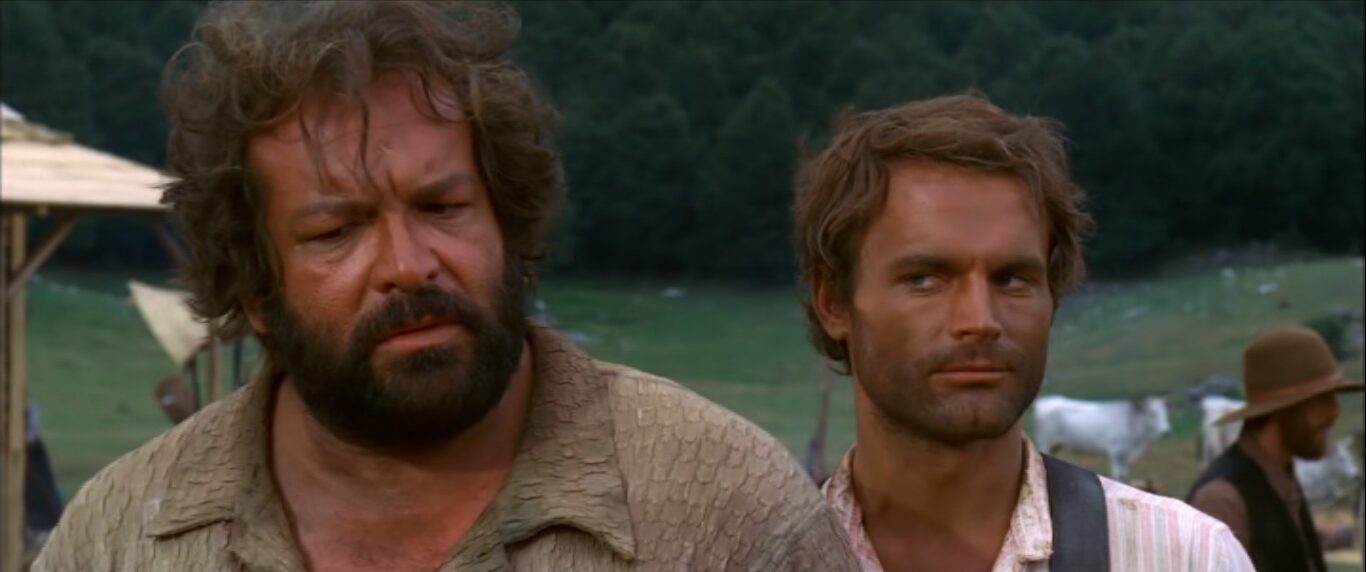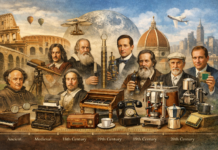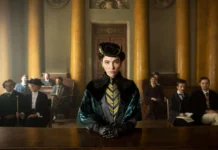
The “Spaghetti Western” represents an iconic subgenre of western films, predominantly made by Italian filmmakers, and often filmed in Spain, particularly the arid landscapes of Almería, which could convincingly stand in for the American Southwest. Defined by their stylized violence, gritty protagonists, and an often ironic or darker sense of humor, these movies stood out from traditional American westerns. Notably, they frequently cast a blend of European actors alongside prominent American stars, such as Clint Eastwood, who found international fame through these roles.
Sergio Leone and the Birth of Spaghetti Westerns
At the heart of this genre is director Sergio Leone, widely recognized as the founding figure of the Spaghetti Western. His groundbreaking “Dollar Trilogy” not only redefined the western genre but also set a new standard for visual style, pacing, and storytelling.
The “Dollar Trilogy”
1. “Per un pugno di dollari” (A Fistful of Dollars, 1964)
The first installment in Leone’s trilogy, starring Clint Eastwood as “The Man with No Name,” introduces a lone gunfighter entangled in a feud between rival families. This film reimagined Akira Kurosawa’s “Yojimbo” within a western context and established the enigmatic antihero trope.
2. “Per qualche dollaro in più” (For a Few Dollars More, 1965)
The sequel brought together Eastwood and Lee Van Cleef, expanding the moral complexities of the genre. Here, two bounty hunters with different motivations team up to pursue a dangerous outlaw, intertwining camaraderie with an air of mutual distrust.
3. “Il buono, il brutto, il cattivo” (The Good, the Bad and the Ugly, 1966)
Often heralded as the pinnacle of Spaghetti Westerns, this film unfolds during the American Civil War, with three gunmen competing to locate a hidden fortune. Known for its iconic score by Ennio Morricone and epic, tension-filled scenes, such as the climactic Mexican standoff, the movie’s combination of action, irony, and visual mastery redefined cinematic language.
Leone’s style diverged sharply from American westerns, avoiding patriotic tropes and instead portraying a hyperbolic world marked by morally ambiguous characters, rampant violence, and a continuous undercurrent of dark humor. With Morricone’s evocative soundscapes, the trilogy created a uniquely immersive experience that captivated audiences worldwide.
Expanding the Spaghetti Western Canon: Leone’s Epics
Following the success of the Dollar Trilogy, Leone continued exploring the western setting, but with greater ambition and depth.
1. “C’era una volta il West” (Once Upon a Time in the West, 1968)
Shot partially in the iconic Monument Valley, this film elevated the Spaghetti Western to new levels of grandeur and myth. With Henry Fonda cast against type as a ruthless villain, alongside Charles Bronson and Claudia Cardinale, the film weaves a tragic tale of revenge, progress, and the closing of the frontier. Its slow, deliberate pace and intricate characterizations set it apart as a cinematic masterpiece.
2. “Giù la testa” (A Fistful of Dynamite, also known as Duck, You Sucker!, 1971)
Blending western and revolutionary drama, this film follows an Irish revolutionary (played by James Coburn) and a Mexican bandit (played by Rod Steiger) embroiled in the Mexican Revolution. With its blend of adventure, idealism, and humor, the film added political complexity to the genre, examining themes of class struggle and betrayal.
Initially dismissed by critics, Leone’s westerns are now recognized as seminal works that reshaped international cinema, establishing him as a revered figure whose influence extends across genres.
Other Notable Directors and Films in the Spaghetti Western Genre
The popularity of Leone’s films spurred a wave of imitations in Italy. Between the mid-1960s and 1970s, Italian studios produced approximately 500 westerns, with varying degrees of success. Some filmmakers managed to infuse originality and substance into the genre, creating films that remain beloved by enthusiasts.
1. Sergio Corbucci
•“Il grande silenzio” (The Great Silence, 1968) – Set in a snowbound landscape, this stark and atmospheric film stars Jean-Louis Trintignant and Klaus Kinski. With its downbeat ending and critical view of frontier justice, Corbucci’s film is regarded as one of the most unique and haunting Spaghetti Westerns.
•“Django” (1966) – Perhaps Corbucci’s most famous work, starring Franco Nero as the titular antihero, it follows a lone gunslinger dragging a coffin, which hides a machine gun. The gritty, almost apocalyptic vision and brutal violence set it apart, inspiring numerous unofficial sequels and homages.
2. Sergio Sollima
•“La resa dei conti” (The Big Gundown, 1966) – With Lee Van Cleef and Tomas Milian, this film features a relentless manhunt and tackles social themes like justice and class, while offering classic Spaghetti Western action.
•“Faccia a faccia” (Face to Face, 1967) – Sollima’s nuanced story involves a Boston professor who becomes entangled with a bandit gang, exploring the moral ambiguity of violence and transformation in the harsh frontier.
3. Damiano Damiani
•“Quien sabe?” (A Bullet for the General, 1966) – One of the early “Zapata westerns,” this film mixes revolutionary zeal with cynical undertones, featuring Gian Maria Volonté as a bandit who gradually aligns himself with revolutionary ideals.
4. Enzo G. Castellari
•“Keoma” (1976) – This later entry into the genre stars Franco Nero and reflects both traditional Spaghetti Western style and a revisionist perspective, blending mysticism and gritty violence. Its existential themes and striking cinematography make it a notable work in the genre’s twilight years.
Comedy and Satire in the Spaghetti Western: Lighter Takes on the Genre
While many Spaghetti Westerns leaned toward darkness and moral ambiguity, a subset of the genre embraced comedy, combining classic western tropes with humor and elements of commedia all’italiana.
1. “Lo chiamavano Trinità…” (They Call Me Trinity, 1970) and ”…continuavano a chiamarlo Trinità” (Trinity Is Still My Name, 1972)
Starring Bud Spencer and Terence Hill (stage names of Carlo Pedersoli and Mario Girotti), these films introduced a comedic, slapstick sensibility. With their laid-back, peace-loving heroics and humorous banter, the “Trinity” films became massive hits and remain beloved for their charming, unconventional take on the western.
2. “Il mio nome è Nessuno” (My Name is Nobody, 1973)
Produced by Sergio Leone and featuring Henry Fonda and Terence Hill, this film combines classic Spaghetti Western elements with farcical humor. It follows an aging gunslinger and his lighthearted companion, capturing the genre’s epic scope while playfully deconstructing it. The film serves as both a tribute and a humorous farewell to the Spaghetti Western.
Legacy of the Spaghetti Western
The Spaghetti Western transformed the global perception of the western genre, blending Italian artistry with iconic American symbols. The gritty realism, antiheroes, and stylized violence resonated worldwide, influencing filmmakers like Quentin Tarantino, Robert Rodriguez, and John Woo. The genre also opened doors for talented composers, such as Ennio Morricone, whose scores became legendary.
Today, the Spaghetti Western is celebrated as an innovative and enduring subgenre, and films like Leone’s masterpieces are frequently ranked among the best in world cinema. Once dismissed as “B-movies,” these films have earned their place in the canon of cinematic classics, recognized for their artistry, inventiveness, and lasting influence.
Italian Dating & Chat for Italian Singles

Virtually meet thousands of like-minded Italian singles and connect at lightning speed; on desktop, tablet, and your beloved phone. Chat into the wee hours of the night if you’d like. Post photos, share your interests and dreams-we’ll help you look your best while you do it.Here we make it easy to meet Italian singles and feel things out first so when you do go on that first date, or meet for espresso, you can relax and be yourself. Try it now!





